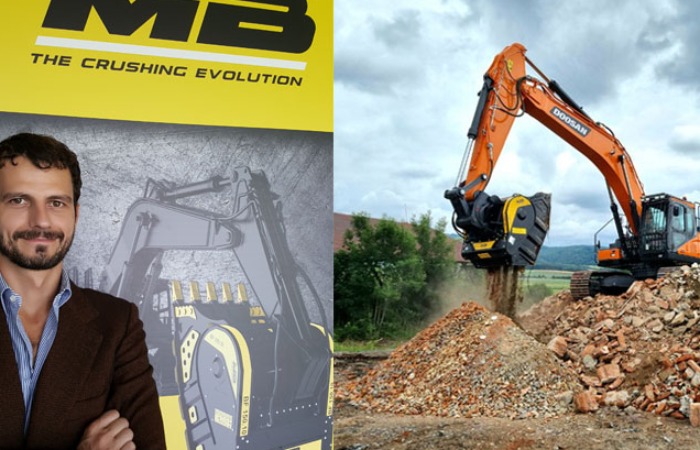
India is one of the most important markets for us globally
Piero Guizzetti, CEO, MB Crusher India
How are your machines addressing the demand for efficiency, safety, and sustainability in India’s infrastructure growth?
Amidst the engineering complexity of our machine, the core value of our equipment is very simple. If you can process material at the job site, you save time, fuel, transport, and handling. That immediately improves efficiency and reduces costs. Our crusher and screening buckets turn excavators and loaders into mobile processing units. One base machine. One operator. One MB unit. No secondary equipment required.
This approach also supports sustainability in a tangible way. Instead of transporting waste out and bringing aggregates in, contractors can recycle what is already available at the site. That reduces trucking emissions and minimizes disturbance to nearby communities.
On the safety side, we use hydraulic drives, lower noise levels, adaptable dust suppression, and enclosed crushing chambers. These are meaningful improvements for urban construction, tunnels, and road projects where worker and community safety are under constant scrutiny.
With India focusing on mega infrastructure projects, how do you see the demand evolving for large vs. mid-sized or small equipment?
India’s growth story is multi-layered. Yes, you have mega expressways, high-speed rail, and freight corridors. But at the same time, the real development milestone for the country is rural connectivity, village roads, water supply networks, and housing missions. For every major project, you need arteries to connect the last mile(s).
This means demand is rising at both ends of the equipment spectrum. You need large, high-capacity machines for highways and mining, and you need compact, versatile, and fuel-efficient equipment for rural and semi-urban projects.
Our portfolio works well in this environment because our attachments are sized for everything from a 4.5-tonne backhoe to a 100-tonne excavator. A contractor in a metro and one that is in a remote district can both use MB Crusher, configured for their reality and with respective value addition related to their specific site dynamics.
What role does localisation play in your product strategy for India?
India is often conceived as a price-sensitive market. It is more of a value-sensitive market with a very competent ecosystem, whereby your counterparts are the Owner and/or highly experienced engineers that want to deep dive on all aspects related to your product and solution. Customers want to understand why they are paying, how quickly the investment will recover, and what long-term performance looks like. So we have had to ensure that our pitch is sound, backed by facts, and capable of clearly quantifying and demonstrating tangible and intangible benefits.
We remain 100 per cent made in Italy, enabling us to better control quality and reliability under one roof, a core aspect of our identity. However, localisation for us means adapting to Indian conditions. We have modified jaw designs, reinforcements and wear part compositions based on Indian rock types and historical data. We have introduced reinforcement in our crusher bucket based directly on feedback from Indian contractors.
Equally important is our dealer and service network. You cannot serve India from one city. You need to be present, responsive, and consistent across regions.
How is your company addressing after-sales service and spare parts availability in remote project sites?
This industry runs on uptime. If a machine is down, the project is down. We have built a strong nationwide support network and invested heavily in training dealer technicians and operators. Many of our most successful deployments are in extremely remote locations, from border roads in Ladakh to high-altitude regions in Himachal. The reason they work is not only the product design but the support structure behind it. We take that part of the business very seriously.
What are your growth priorities for the Indian market in the next three to five years?
Three priorities:
- Expand the installed base so more contractors can experience on-site material processing firsthand and we can cross fertilise such installations.
- Strengthen training and service programs to maximize equipment life and productivity.
- Identify, pursue and penetrate more application-specific channels, particularly where mobility and sustainability are key.
India is one of the most important markets for MB Crusher globally. The scale of infrastructure development here aligns perfectly with our approach to crushing and screening.


 +91-22-24193000
+91-22-24193000 Subscriber@ASAPPinfoGlobal.com
Subscriber@ASAPPinfoGlobal.com